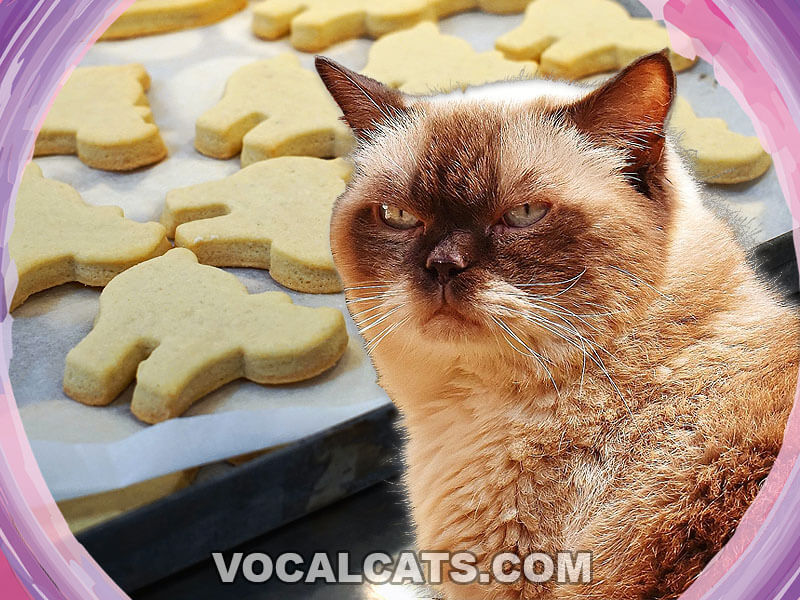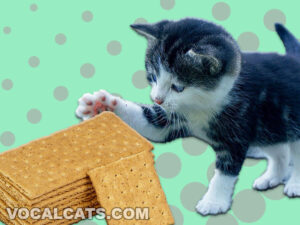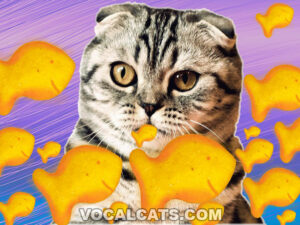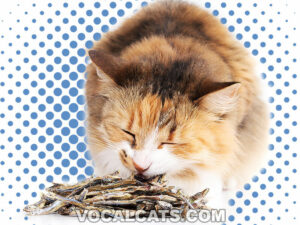Can cats eat Animal Crackers? No, cats should not eat Animal Crackers because they are full of sugar, carbs, baking soda, and salt. None of these ingredients benefit our feline companions’ health. With little to no nutritional value, Animal Crackers don’t give your cat the protein and fat that obligate carnivores need. Instead, regular consumption of Animal Crackers can lead to feline obesity, sodium poisoning, and a host of other digestive issues, including diarrhea, nausea, and vomiting.
Shaped like animals you will usually find in a circus, Animal Crackers are sweet to the taste, as opposed to the salty taste of the Goldfish Crackers or Saltine Crackers. Although the name might suggest that you can toss one or two to your feline friends, it’s not a good idea since this is very much a human snack.
One Animal Cracker contains 1.5 grams of total carbohydrates and 0.4 grams of sugars. The combination of these two can lead to long-term health issues in your fuzzy friends. Keep reading to find out why we should avoid feeding our cats Animal Crackers.
Contents
- Can cats have Animal Crackers?
- Health risk of Animal Crackers on cats
- Do Animal Crackers provide any nutritional benefits for your cat?
- Nutritional value of Animal Crackers
- What if my cat accidentally ate Animal Crackers? What will happen? What should I do?
- Symptoms to watch for
- Treatments if your cat has food poisoning from Animal Crackers
- What are some feline friendly and safe non toxic Animal Crackers alternatives?
- So, can cats eat Animal Crackers?
Can cats have Animal Crackers?
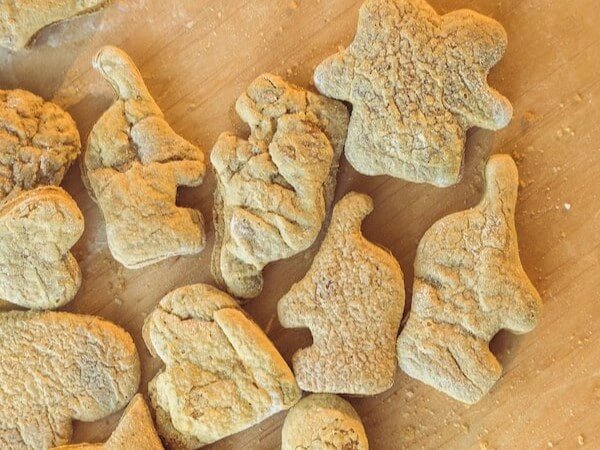
No, cats should not have Animal Crackers because of the variety of ingredients in them that can harm your feline friends one way or the other.
One of them is sugar. While humans can easily develop a sweet tooth and crave sugary foods, the truth is, our feline companions can’t.
That’s because the receptors on the cats’ tongues aren’t sensitive enough to detect sugar. Instead, they are extra sensitive to meat, or more specifically to animal protein and fat.
Because of this, cats can easily develop diabetes, suffer from unnecessary weight gain, and tooth decay if they overconsume sugar.
The second ingredient in Animal Crackers that can harm your kitty cat’s health is sodium or salt. The salt in Animal Crackers can cause sodium poisoning in cats.
The third ingredient, and the main ingredient is the flour. Our feline friends’ digestive system can not easily and properly digest flour. That’s because cats lack the specific enzymes that is responsible for breaking down flour. These enzymes are called amylase and glucokinase.
Let’s discuss more about Animal Crackers below and see why it’s a good idea to keep this human snack away from our feline companions.
RECOMMENDED: Can Cats Eat Graham Crackers?
What are Animal Crackers?

Animal Crackers were first made in England in the 1800s, where they were called ‘biscuits’ or ‘Animals’ because they were shaped like animals, such as lions, elephants, bears, or tigers. They are light-colored and sweet to the taste and come in different flavors, including colorful frosting or dark chocolate.
Later in the 19th century, Animal Crackers were imported to the US, where people took a liking to this Animal-shaped Cracker.
Due to its popularity among the people, many companies sprung up to manufacture Animal Crackers. One of the most famous brand of Animal Crackers is Nabisco, which makes Barnum’s Animals.
What are Animal Crackers made of?
Animal Crackers are made from sugar, enriched flour, salt, soybean oil, some natural flavors, spices, corn syrup, and a leavening agent, such as baking soda. The complete list of ingredients is provided below.
Animal Crackers ingredients
- Enriched flour which includes wheat flour, niacin, reduced iron, thiamine mononitrate (Vitamin B1), riboflavin (Vitamin B2), and folic acid.
- Sugar.
- Soybean oil.
- High fructose corn syrup.
- Salt.
- Baking soda for leavening.
- Soy lecithin is used as an emulsifier.
- Natural flavor.
- Spices including Nutmeg and Mace.
Health risk of Animal Crackers on cats
Cats find it hard to digest too many carbs. There should only be around 10% or fewer carbs in a cat’s diet.
When it comes to Animal Crackers, it’s fair to say that they are full of carbs and sugar.
The carbs can cause indigestion in cats, while sugar can lead to feline obesity, diabetes, and tooth decay.
Due to this, it is better to keep our kittens away from sugar.
Below, we’ll discuss in detail every single ingredient in Animal Crackers and find out how they can harm your little fur babies.
Cats do not need enriched flour in their daily diet
Flour-making is a lengthy procedure that involves a lot of processing before you can get your flour from the grain.
While whole wheat flour retains the nutrients during its processing, this isn’t the case for enriched flour. In the initial stages, the bran and the germ are removed from the wheat. This strips the wheat from its nutrient powerhouse.
The bran is the wheat’s external layer that contains fiber, some minerals, and protein. The germ is the internal layer that contains fat, minerals, and B vitamins.
Now we are left with the endosperm that’s crushed into powder and sifted to remove the remains of the bran and the germ. The endosperm contains a lot of carbohydrates, some protein, B vitamins, fiber, and iron. It is the least healthy part of the seed.
If a bleaching agent is added to the flour at this point to change the flour’s color to white, it also destroys the remaining nutrients. Although after the flour is processed, some of the nutrients are added back to it, known as the ‘enrichment’ process. These nutrients include niacin, reduced iron, thiamine mononitrate (Vitamin B1), riboflavin (Vitamin B2), and folic acid.
It’s important to note that our feline friends can get these nutrients from their regular cat food and not from human snacks like Animal Crackers.
One Animal Cracker weighs 1.9 grams and contains a whopping 1.5 grams of carbohydrates, which means Animal Crackers are nothing but carbs. With the lack of carbohydrates-digesting enzymes in their saliva and liver, cats risk suffering from indigestion, vomiting, diarrhea, and lethargy.
Additionally, since enriched flour is wheat, you’ll want to keep Animal Crackers away from your kittens if they are allergic to gluten or sensitive to wheat.
Too much sugar consumption can lead to feline obesity
The second major ingredient in Animal Crackers is sugar.
Keep in mind that our feline family members cannot taste sugar. Unlike humans, who have 9,000 taste buds, cats only have 470.
Our four-legged friends also lack the TAS1R2 (Taste 1 Receptor Member 2) gene that allows them to taste sweets or sugar. Essentially, they’re missing the 247 amino acid pairs that make up the DNA of this gene.
Furthermore, your fuzzy friends also lack the enzymes that allow sugar digestion. Glucokinase is an essential enzyme in the liver that regulates glucose and carbohydrate levels in the body.
Because your kitties can neither taste sugar nor digest it properly, there are several short-term effects they may experience if they overconsume sugar. These include the following:
- Diarrhea.
- Vomiting.
- Nausea.
- Headaches.
- Muscle tremors.
- Blood sugar level spikes.
- Liver damage.
Sugar is also a source of empty calorie and energy, which means it raises blood sugar levels rapidly, allowing insulin to store much of it as fat. This leads to feline obesity if you allow your kitties to regularly consume sugar.
Other long-term negative health effects include:
- Diabetes Mellitus (Type II Diabetes).
- Tooth decay.
- Irregular heart rate (Arrhythmia).
- Getting extremely hyper.
- High blood pressure level.
- Kidney failure.
- Heart disease.
- Change in metabolism.
Soybean oil isn’t the best type of oil for cats
Besides carbs and sugars, another ingredient found in Animal Crackers is soybean oil. Extracted from soybean seeds, soybean oil is a popular vegetable cooking oil. Although it is used a lot in the human world, it can ruin your cat’s stomach and digestive system.
Although soybean oil contain both omega-3 fatty acids and omega-6 fatty acids (both of which are good for our fuzzy friends), we want to point out that our feline companions prefer animal-based fat and not fat from soybean oil.
Furthermore, we want to make you aware that soybean oil do contains a form of anti-nutrients called phytates or phytic acid which blocks your cat’s body from absorbing certain nutrients and minerals into its blood. Phytates also prevent enzymes from working properly, leading to liver failure in your cat.
If you’re looking for a list of oil that is best for cats, here are some we highly recommend:
- Cod liver oil.
- Fish oil.
- Krill oil.
- Hemp oil.
- Flaxseed oil.
- Coconut oil.
- Sunflower oil.
- Olive oil.
High fructose corn syrup is sugar which can cause obesity and diabetes in cats
High fructose corn syrup is just liquid sugar made from corn. It is generally used as a sweetener in fruit-flavored drinks and sodas.
Manufacturers use high fructose corn syrup instead of sugar because it is a cheaper version of regular sugar. When our furry friends consume large quantities of food or snack that contains high fructose corn syrup, they may start to experience many health issues, both in the short and long term.
Continuous consumption of high-fructose corn syrup can lead to Type II diabetes, feline obesity, and changes in metabolism, which can escalate to heart disease in cats.
High salt level can lead to sodium poisoning in cats
It is very dangerous when our feline friends consume a lot of salt. Ingesting too much salt can affect your four-legged friends’ electrolyte levels and this can lead to sodium poisoning (also known as hypernatremia).
Other health issues that can occur as a rsult of consuming too much salt includes:
- Vomiting.
- Diarrhea.
- Dehydration.
- Excessive thirst.
- Incoordination.
- Muscle tremors.
- Lethargy.
- Seizures (in severe cases).
- Coma (in severe cases).
However, that doesn’t mean your little fur babies can’t have salt at all. In fact, their regular, balanced diet of canned or wet cat food should contain a healthy amount of salt that your feline family members require daily.
If you’re curious and want to know how much salt can a cat have per day, it is usually around 20 to 40 mg daily depending on your fuzzy friend’s weight.
Anything beyond that can become toxic and lead to sodium poisoning in cats. Furthermore, it can also cause water retention that can make your kitty cats obese in the long term. In the short term, salt toxicity can actually cause coma or even seizures in cats.
Baking soda is harmful to cats in large quantities
Baking soda in Animal Crackers are used for leavening, which means that it is responsible for giving Animal Crackers their optimal texture and volume.
Also known as sodium bicarbonate, baking soda is made from salt (sodium) and bicarbonate.
Therefore, like salt, if your feline friends consume a lot of baking soda, their electrolyte balance can be disrupted. The sodium levels in their body would increase while their calcium and potassium levels would decrease. This can then lead to baking soda toxicity in cats.
Signs and symptoms of baking soda toxicity in felines includes:
- Dehydration.
- Diarrhea.
- Shortness of breath.
- Disorientation.
As we can see baking soda would not benefit your cat’s health; therefore, giving food or snacks like Animal Crackers that contain baking soda would serve no health purpose to your fuzzy friends.
To ensure your kittens stays safe, limit the baking soda intake to less than one teaspoon per pound of your cat’s weight. Just 1 to 2 teaspoons of baking soda is enough to create negative side effects in cats.
Soy lecithin is harmful to cats that have soy allergy
Soy lecithin is a food additive used either as a lubricant or an emulsifier. As an emulsifier, it allows two immiscible liquids to mix easily. An example is oil and water. It does this by reducing the surface tension between both liquids to make a stable emulsion of the two.
Although it can help cats get rid of their hairballs as they pass through the digestive tract, soy lecithin can still harm your cat.
This is because it contains soy, an ingredient that is genetically modified in the U.S., or at least 95% of it is soy.
Soy is genetically modified because a harsh pesticide is sprayed on the crops during growth, which is poisonous to our feline family members. The genetic modification strengthens the soy’s resistance to this spray. However, it still contaminates the plant.
To stay safe, anything with a little soy lecithin is fine for your kitties, but make sure they doesn’t overdose on it.
Some natural flavor in Animal Crackers may be harmful to cats
According to the FDA, the natural flavor can be anything: oleoresin essential oil, fruit, fruit juice, edible yeast, protein hydrolysate, herb, bark, root, bud, leaf, meat, eggs, poultry, seafood, dairy products, vegetable juice, or any product of heating, roasting, or enzymolysis.
Natural flavor is only used in food to enhance its flavor and has no significant nutritional purpose or benefit.
Some of these flavor enhancers can be okay for cats, but the yeast among them can be harmful. If consumed, the yeast continues to rise in the stomach and this can lead to bloating.
In worst case scenario, surgery may be required to treat this health issue.
Nutmeg and mace can be toxic to cats in large quantities
There are two specific spices used in Animal Crackers. They are nutmeg and mace.
Spices like nutmeg and mace can be toxic to your four-legged friends if consumed in large amounts.
That’s because nutmeg contains myristicin, an essential oil that can be poisonous to cats if consumed in large quantities.
Both spices come from the same tree, and while nutmeg is the seed, mace is the covering of that seed.
Overconsumption of these nutmeg and mace can lead to the following symptoms:
- High blood pressure.
- Disorientation.
- Seizures.
- Increased heart rate.
- Tremors.
- Other abnormalities in the cat’s nervous system.
If you suspect your feline companion has mace or nutmeg poisoning, we highly recommend that you contact your cat’s vet as soon as possible. If your vet isn’t available, you’ll need to call the pet poison helpline right away. You can reach them at 855-764-7661.
Half a teaspoon of these spices in a day won’t let your cat go through such serious health issues, but overconsumption will. Therefore, it is important to check the ingredient list of any food product before offering it to your furry friends.
Do Animal Crackers provide any nutritional benefits for your cat?
No, Animal Crackers do not provide any nutritional benefits to your cats. Any vitamins or minerals in Animal Crackers can be found in your cat’s regular feline food.
While Animal Crackers do contain a little bit of protein, fiber, and potassium, the amount of carbs and sugar found in this human snack far outweigh the positives.
Your cat would not only be on empty calories, but also they would be high on energy for a little while after eating some Animal Crackers. As soon as the insulin eats up all the glucose in his blood, he would be hungry again .
This will lead to feline obesity, which is not good for your cat in the long run.
Nutritional value of Animal Crackers
As we can see from the nutritional profile of Animal Crackers, just one Animal Cracker weighs 1.9 grams and contains around 7.5 calories.
To check how many calories your feline friends should consume per day, you should know how much your cat weighs.
As a standard, a cat should have around 24 to 35 calories per pound each day. So, a nine-pound cat should consume no more than 315 calories daily.
When it comes to giving your feline family member treats, it’s important to keep this in mind:
Treats should not exceed 10% to 15% of your feline’s daily caloric intake.
Therefore, the other 85% to 90% of your feline’s diet should be a well-balanced and nutritionally complete diet.
Animal Crackers should not be the major source of calories for your cat.
If we take a look at the nutritional profile of Animal Crackers again, we see this:
A single piece of Animal Cracker has about 8 calories, 0.1 grams of fat, and 1.5 grams of carbohydrate (0.4 grams of sugar).
This means that your little fur babies are at risk of developing the following health issues if they consume Animal Crackers regularly:
- Heart disease.
- Indigestion issues.
- Diabetes.
- Diarrhea.
- Vomiting.
- Lethargy.
- Dental issues such as tooth decay.
Animal Crackers nutrition facts (1 Animal Cracker or 1.9 grams)
| Name, Unit | Amount |
| Calories, cal | 7.5 |
| Total Fat, g | 0.1 |
| Sodium, mg | 6.6 |
| Total Carbohydrate, g | 1.5 |
| Dietary Fiber, g | 0.1 |
| Total Sugars, g | 0.4 |
| Protein, g | 0.1 |
| Potassium, mg | 3 |
What if my cat accidentally ate Animal Crackers? What will happen? What should I do?
Most likely, your feline friends will be fine if they consume one or two Animal Crackers.
However, if your entire box of Animal Crackers is empty, you must take your cat to a vet immediately. Due to high levels of carbs, sugar, and salt, your cat is at risk of sodium poisoning and other digestion issues, such as vomiting, lethargy, tremors, seizures, and diarrhea. The sooner your feline friends are treated, the better.
As we can see, it’s best to keep your box of Animal Crackers out of your cat’s reach to avoid any issues with accidentally overconsuming this crunchy human snack.
Symptoms to watch for
If your fuzzy companions overconsume Animal Crackers, they may experience the following signs and symptoms:
- Diarrhea.
- Vomiting.
- Lethargy.
- Dehydration.
- Loss of appetite.
- Seizures.
- Tremors.
- Incoordination.
- Disorientation.
- Muscle spasms.
If you observe any of the above signs and symptoms or notice any changes in our feline’s behavior, we highly recommend that you bring him or her to the vet immediately.
Treatments if your cat has food poisoning from Animal Crackers
Animal Crackers contain a lot of carbs and sugar, which aren’t good for your cat in large amounts.
So, your cat may start to vomit because his body may have a hard time digesting the Animal Crackers.
If you notice your little fur baby is vomiting and continues to vomit for more than an hour, you’ll want to bring him to see the vet as soon as possible. If your cat appears lethargic, it’s a good idea to consult with your vet.
The vet can prescribe a diet for your cat and provide appropriate medications, such as antacids, to help relieve your cat’s indigestion.
If your kitty suffers from sodium poisoning, your vet may advise leaving him at the hospital overnight. This allows the hospital staff to monitor your feline friend and check his electrolyte levels.
In addition to administering IV fluid, your vet may provide fresh water and other treatments to your cat at frequent intervals. This will help nurse your cat back to health.
What are some feline friendly and safe non toxic Animal Crackers alternatives?
The best thing you could give to your cat is animal protein. So toss your cat some boiled chicken, cooked beef, or canned tuna. These will keep your cat’s heart healthy and will give him the calories he needs without the risk of becoming obese or diabetic.
You can also incorporate some high-quality cat food into your feline’s diet. High quality cat food should be nutritious, well-balanced and complete with ingredients that satisfy your cat’s nutritional needs.
Other foods you can give your kitty cats include sliced carrots or unflavored zucchini. Both are these vegetables are full of vitamins and minerals like potassium and magnesium that will benefit your cat’s health.
So, can cats eat Animal Crackers?
Animal Crackers are not the best snack food for your kittens because they contain many harmful ingredients that can cause many health issues in cats, including feline obesity, sodium poisoning, diabetes, and digestive issues. To keep your cat healthy, give him ample animal-based protein, fresh water, and a well-balanced diet.
DISCLAIMER: THIS WEBSITE DOES NOT PROVIDE MEDICAL ADVICE
The information, including but not limited to, text, graphics, images and other material contained on this website are for informational purposes only. No material on this site is intended to be a substitute for professional veterinary advice, diagnosis, or treatment. Always seek the advice of your veterinarian or other qualified health care provider with any questions you may have regarding dietary needs.
Resources:
https://en.wikipedia.org/wiki/Animal_cracker
https://www.petpoisonhelpline.com/
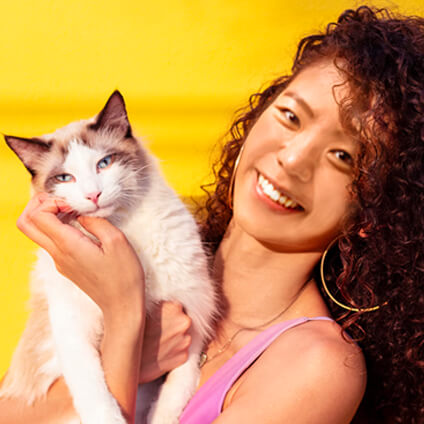
With over five years of specialized experience as an animal writer, my expertise lies in cat nutrition, health, behavior, grooming, and training. I am dedicated to delivering helpful and informative content that caters to the well-being of our feline friends. My primary goal is to empower pet owners with knowledge and ensure our feline companions thrive in health and happiness. In my free time, I love volunteering at local cat rescue centers.
